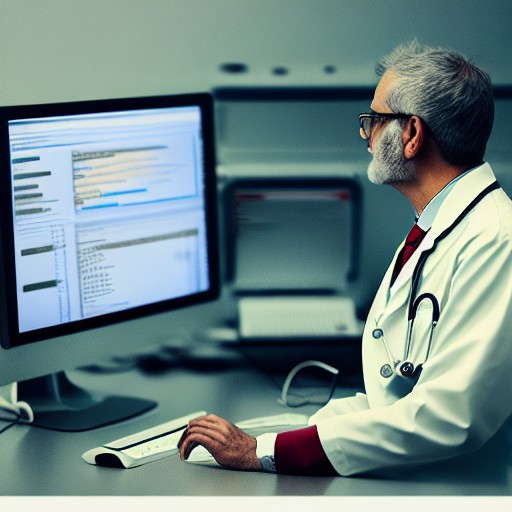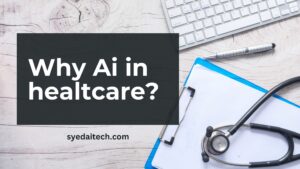
Table of Contents
Why Ai in healthcare?
The intention behind mentioning data science and AI in healthcare is not to suggest that current medical practices are inaccurate or inadequate. Rather, it’s about augmenting and enhancing the capabilities of healthcare professionals by leveraging data-driven insights and advanced technologies.
Ultimately, the goal is to support healthcare professionals in their efforts to deliver the best possible care to patients by harnessing the power of data and technology.
Data analytics and AI are transforming the healthcare industry in remarkable ways. From personalized treatments to early disease detection, these technologies are helping doctors provide better care and improve patient outcomes.
Data science has immense potential to transform the healthcare industry by leveraging data to improve patient outcomes, optimize operations, and drive innovation. Here’s how data science is applied in the healthcare industry:
1.Clinical Decision Support Systems (CDSS):
- Data science techniques, including machine learning and natural language processing, are used to develop CDSS that assist healthcare providers in making accurate diagnoses and treatment decisions.
- CDSS analyze patient data, medical records, imaging studies, and other relevant information to provide evidence-based recommendations, alert clinicians to potential risks or errors, and personalize treatment plans.
2.Drug Discovery and Development:
- Data science plays a crucial role in drug discovery and development by analyzing biological data, chemical structures, clinical trial data, and real-world evidence to identify potential drug targets, predict drug efficacy and safety, and optimize drug development pipelines.
- Machine learning models accelerate the drug discovery process, prioritize candidate compounds, and identify novel therapeutic interventions for various diseases.
3.Predictive Analytics for Disease Prevention and Early Detection:
- Data science models are used to analyze large-scale healthcare datasets, including electronic health records (EHRs), genomics data, and wearable device data, to identify patterns, risk factors, and early indicators of diseases.
- Predictive analytics help healthcare organizations intervene proactively, identify at-risk populations, and implement preventive measures to improve health outcomes and reduce healthcare costs.
4.Personalized Medicine and Precision Healthcare:
- Data science enables the development of personalized treatment plans tailored to individual patients’ genetic makeup, lifestyle factors, medical history, and treatment responses.
- Machine learning algorithms analyze patient data to predict optimal treatment options, drug responses, and dosage adjustments, leading to more effective and targeted therapies with fewer adverse effects.
- Healthcare Operations Optimization:
- Data science techniques, such as operations research and predictive modeling, are applied to optimize healthcare operations, including resource allocation, scheduling, inventory management, and capacity planning.
- Predictive analytics help healthcare facilities forecast patient demand, optimize staffing levels, reduce wait times, and streamline workflow processes to improve efficiency and patient satisfaction.
5.Population Health Management:
- Data science is used to analyze population-level health data, demographic information, social determinants of health, and environmental factors to identify health disparities, trends, and areas for intervention.
- Population health management initiatives leverage data-driven insights to design targeted interventions, allocate resources effectively, and implement preventive strategies to improve the overall health of communities.
Challenges and Considerations:
While data science and AI offer tremendous potential in healthcare, several challenges must be addressed, including:
- Data Privacy and Security: Healthcare data are sensitive and subject to strict privacy regulations like the Health Insurance Portability and Accountability Act (HIPAA). Robust security measures, including encryption and access controls, are essential to protect patient confidentiality.
- Algorithm Bias and Interpretability: Machine learning models may exhibit biases or unintended consequences, particularly when trained on biased datasets. Ensuring algorithm fairness and interpretability is critical for building trust and acceptance among clinicians and patients.
Conclusion:
In conclusion, data science and AI are transforming the healthcare industry in remarkable ways. From personalized treatments to early disease detection, these technologies are helping doctors provide better care and improve patient outcomes. As we continue to unlock the potential of data science and AI, the future of healthcare looks brighter than ever before.
.

Mysimba – Quick and Easy Weight Lass
Mysimba is a medicine used along with diet and exercise to help manage weight in adults:
who are obese (have a body-mass index – BMI – of 30 or more);
who are overweight (have a BMI between 27 and 30) and have weight-related complications such as diabetes, abnormally high levels of fat in the blood, or high blood pressure.
BMI is a measurement that indicates body weight relative to height.
Mysimba contains the active substances naltrexone and bupropion.
https://cutt.ly/RezL73vz
Mysimba – Quick and Easy Weight Lass
Mysimba is a medicine used along with diet and exercise to help manage weight in adults:
who are obese (have a body-mass index – BMI – of 30 or more);
who are overweight (have a BMI between 27 and 30) and have weight-related complications such as diabetes, abnormally high levels of fat in the blood, or high blood pressure.
BMI is a measurement that indicates body weight relative to height.
Mysimba contains the active substances naltrexone and bupropion.
https://cutt.ly/RezL73vz